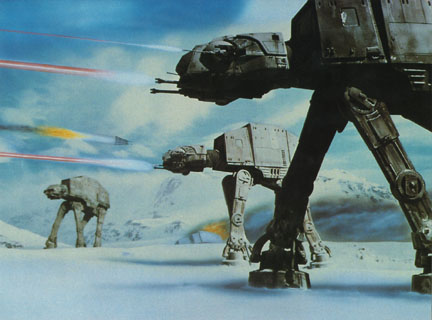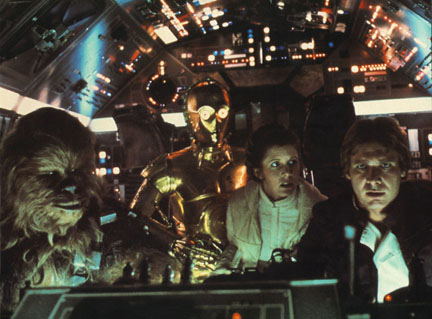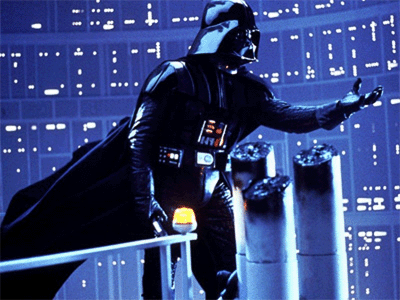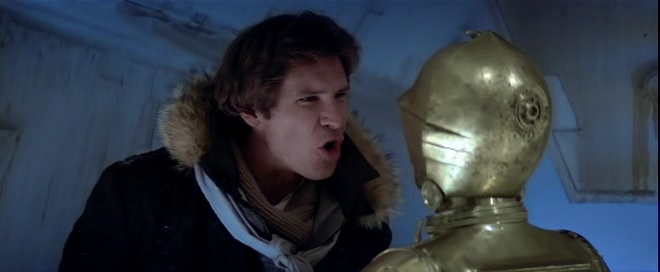From The Soho News, May 21, 1980. — J.R.
The Empire Strikes Back
Story by George Lucas
Screenplay by Leigh Brackett and Lawrence Kasdan
Directed by Irwin Kershner
Let’s face facts. Whether you or I love, hate or feel indifferent to The Empire Strikes Back — or any of the seven sequels and “prequels” to Star Wars slated to interfere with our lives over the next two decades — doesn’t make the slightest bit of difference in the long run, on the cosmic scale of things. Nor does it matter all that much in the mundane short run, either. Even if you stay away from the movie, manage to shun the novel and T-shirt and comic, avoid the soundtrack album and toys and video cassette, you can bet that a skilled team of disinterested humanitarians and technocrats, working round the clock with computers has decided that it’s so good for you and your kids that there’s no way you can prevent it from being crammed down your throats, in one form or another.
You’d better grin and bear it, if you know what’s good for you. The celestial machinery that has already turned Star Wars into the biggest grosser to date (“of all time” might seem a little excessive in forestalling the future) isn’t taking any chances in its investment by branching our or experimenting much. We’re basically stuck with the same formula as before, even down to the identical opening title (“A long time ago, in a galaxy far, far away…”) and John Williams theme music. A closely monitored Irwin Kershner — who directed A Fine Madness, Loving and Eyes of Laura Mars — is in charge of direction, and if the budget is a whopping $22 million in contrast to Star Wars‘ $10.5, this is probably because three years ago, in an economy far, far away, there was a lot less inflation to contend with.
What are some other differences? Mark Hamill as Luke has aged even more visibly than the economy since Star Wars, and this change, along with Kershner’s direction, appears to have humanized him a little; the old Southern California insolence is pleasantly absent. A form of stop-motion animation associated with the original King Kong seems to motor some of the improbable prehistoric beasties on the planet of Dagobah — a rather lifeless setting stitched together out of apparently vague memories of Tarzan and Kong. (Like most of the other sets, it comes across as peculiarly placeless, too — a given number of predesigned shots, angles and effects that never add up to more than the sum of their parts.)
***
In deference, perhaps, to last summer’s Alien, a bit more ooze, slop, and pucker is added to some of the gore; and amputation freaks will have the kick of seeing both See-Threepio and Luke Skywalker deprived of certain limbs before being comically and/or magically reassembled. The violence, in general, tends to be as throwaway as the comedy — virtually designed to be forgotten as soon as it elicits the desired immediate effect, so that after Han Solo (Harrison Ford) is tortured at Darth Vader’s orders, in a baroque manner reminding me of torture in Vietnam, Brazil, Chile or elsewhere (a long timr ago, in a galaxy far, far away), the movie quickly turns into a disposable goof by having Han remark, for laughs, “I feel terrible.”
At least two major characters have been added to the intimate circle of humans, machines and animals that formed the front line of Star Wars. Yoda, the most significant and ambitious of these, is a squat green snome with pointed ears like giant peapods — a sort of cross between Wallace Shawn and a gigantic peyote button (although, in the Marvel Comics version, where he’s colored lavender, he looks more wizened and less whimsical) –who turns out to be Luke’s Jedi master, the original instructor of none other than Ben Kenobi (Alec Guinness) himself. Operated by Muppetmaster Frank Oz (who usually handles Miss Piggy), Yoda comes across as a concept more than a character. The same can’t quite be said for Lando Carlrissian (Billy Dee Williams), an old crony of Han on the planet of Bespin — a token black whose presence can perhaps be partially explained by the concern of producer Gary Kurtz, voiced in these pages three years ago (“In the Wake of the Wars,” R.M. Whyte, June 2, 1977), that the treatment of aliens in Star Wars as “surrogate ethnics” might cause some distress. (“Yes, we may run into the race problem.”)
***
The frantic, rather demagogic tempo of The Empire Strikes Back expands on the overall principle of its predecessor, whereby a succession of cliffhangers is nearly all that’s needed for a plot, just as a smoargasbord of visual styles (The Wizard of Oz, King Kong, Forbidden Planet, Things to Come, This Island Earth, 2001: A Space Odyssey) is broadened still further to substitute for an imaginatively created universe. Notwithstanding the claim of Time and a few academics that Lucas is merely carrying on the great tradition of Homer, the Old Testament, Virgil, the Koran, and Walt Disney, the overall ambience of this adventure often seems mechanical, willed and needlessly fussed over. If most of the movie is too fast to be boring, very little of it is slow enough to capture the attention more than fitfully, in the sort of bite-sized chunks rationed out by most TV shows.
The contemporary flavor of the dialogue, decor and costumes — from the banter of Han Solo and Princess Leia Organa (Carrie Fisher) to the jive-ass cape of Lando Carlrissian to the carbon-freezing chamber resembling a disco lounge — testifies to the movie’s glib confidence that today is like forever. (Insofar as money talks, it may be right. And if the cover of last week’s Time is anything to go by, The Empire Strikes Back is approximately sixteen times more important to the present than the recent influx of Cuban refugees — apparently because of the anticipated revenues involved.)
Nevertheless, one might ask, is it fun? In a manner of speaking, yes. The movie begins with the assumption that everyone in the universe has already seen Star Wars, and I doubt that anyone who hasn’t will be able to follow the plot without some confusion — although the relative absence of exposition does keep things speeding along at a breakneck clip. Writing this review only three days after seeing the film, I’m amazed — not to say delighted — that I can remember so little of it, apart from a neat little surprise ending that I won’t give away, even though you’ve probably already heard about it. But not remembering is in a way what this movie is all about: it helps to prime us for the next bloody spinoff sequel.
—The Soho News, May 21, 1980





